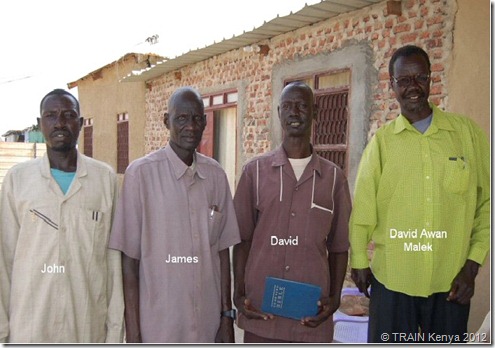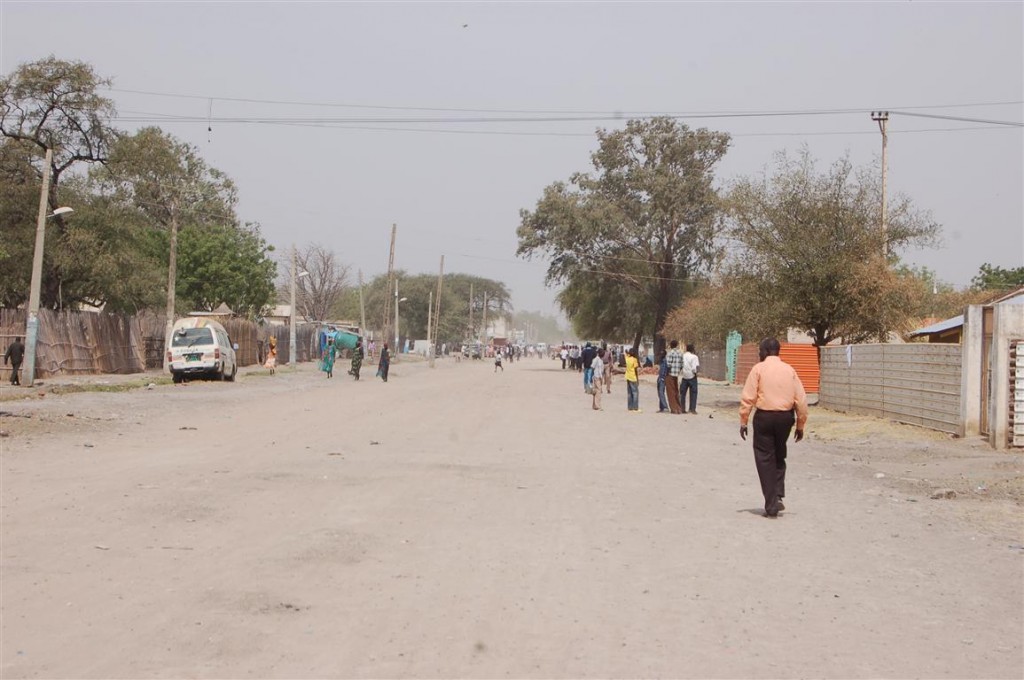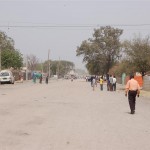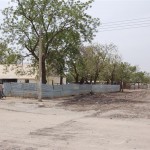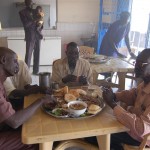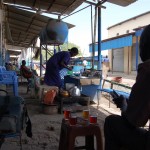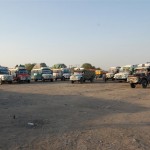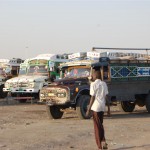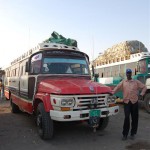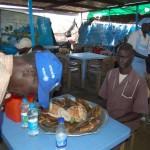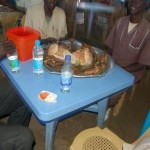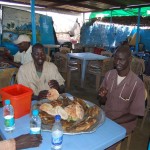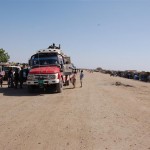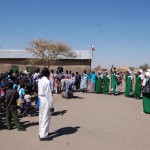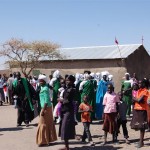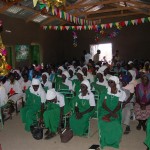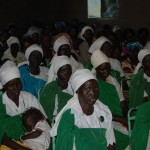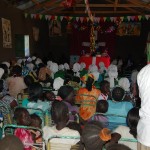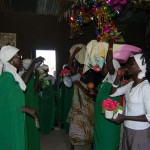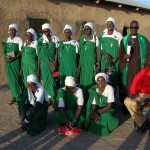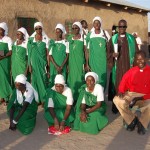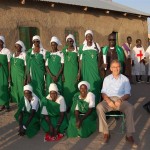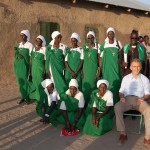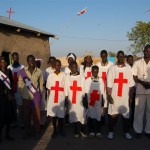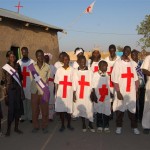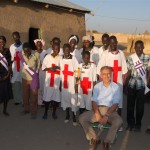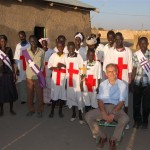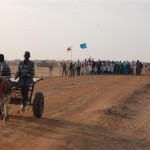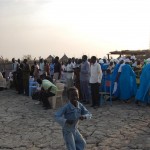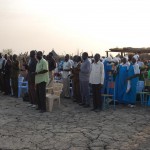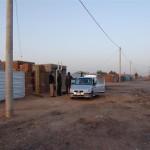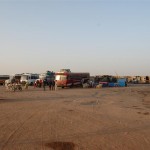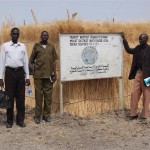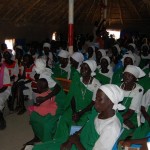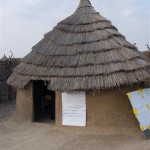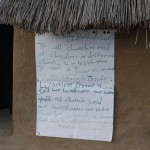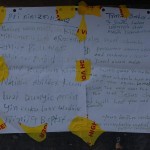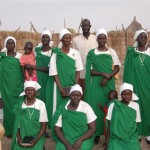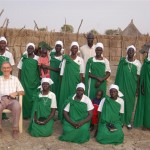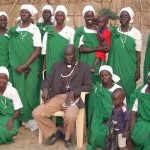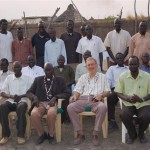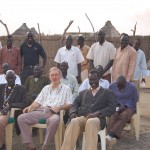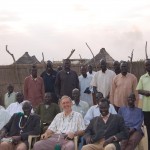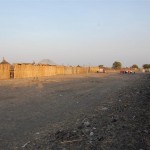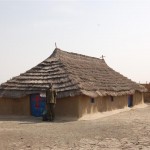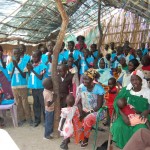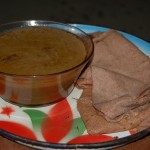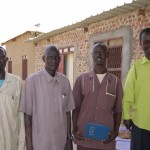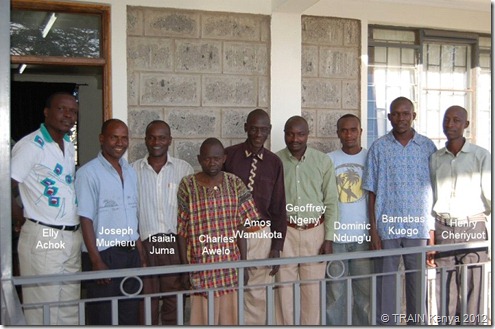Background
The initial contact with these Sudanese brethren was made in Nairobi when some years back James Lual was seeking a ‘Trinity Baptist Church’ with which they could partner. He came to Nairobi hoping to attend a Bible College, which he did for 2 years, the Bible College of East Africa.
James represented brethren who were forced to flee from their homes east of Malakal along the Sobat River in 1992 when the Government forces occupied the area. They went north, especially to the town of Kenana, where the Trinity Baptist Church of Sudan started, having come out of Presbyterianism. They want to forge links with us in Nairobi for the immediate purpose of training leaders.
South Sudan became a fully independent country on July 11, 2011, having been semi-autonomous within the larger Sudan since the brokerage of the peace deal in 2005. The decades of civil strife devastated the country. There is basically no infrastructure. The ‘main’ road north from Malakal to Renk on the border with Sudan is a dirt road, but it is in such bad condition that for much of the 300 kms. drivers prefer the small track they have worn through the bushes! Of the 3 towns I visited (Malakal, Paloich, Renk) I found Renk the most developed because it is nearest the north – this is where the tarmac begins all the way through to Khartoum. There is no town centre that I would recognize, few permanent buildings, almost nothing modern. Most houses in the town are mud and grass thatched (there is plenty of grass outside the towns). Some mud walls have been faced with cement and have an iron sheet roof. A few are constructed with brick. There is some street lighting for the wide dirt roads in town, and a few homes have electricity. Modernity is seen everywhere in the use of mobile phones, and I was able to use the internet, although it was a bit slow. Outside the Pastor’s house in Paloich each evening children were eagerly watching DSTV.
It is a time of great transition for South Sudan as they take possession of their economy and use their oil wealth to develop the country. While I was there was a dispute with Sudan, through which all oil has been exported by pipeline, which has resulted in the closure of all oil wells. This will have an impact on development plans, such as building a completely new capital. In their rejection of the North they have made English the official language. Few speak English well; most know Arabic. English will be known by the upcoming generation through education. Much patience will be needed. I found everything very expensive as almost nothing is produced in the country. You will perhaps have been aware that there have been serious clashes between different communities recently.
During the civil war there was a massive turning to Christianity, but one wonders how much of this is a turning to the Lord from idols to serve the living and true God and to wait for His Son from heaven.
Friday 20th.
My flight to Addis Ababa by Ethiopian departed at 03.30! Going through Addis gave me the opportunity to have a few hours with brother AO and family although I was so tired. He is involved in broadcasting the gospel in his S0mal1 language 3 times a week and travelling extensively to follow up contacts. He had just concluded a Conference that brought together more than 50 S0mal1 Christians from different parts of the world. May there be a very great turning to the Lord.
While waiting at the modern Bole Airport in Addis, and on the flight to Juba (South Sudan) there was opportunity to talk with a number of Ethiopian Orthodox adherents. Friday and Saturday were very important days with the special celebration of Timkat when every church parades the replica of the ark through the streets. In God’s providence, I sat next to a young lady, an Ethiopian architect working in Juba. As a young, successful person it was interesting to hear her say that she was in the Ethiopian Church by choice, not just because of upbringing. She told me that the Church is paying increasing attention to the Bible, and she claimed to know something of the Bible and reads it regularly. We turned to talk about other Churches that she labelled ‘born-again’ about which she has heard from colleagues. She went once and found the noise and emotion ‘absurd’ (sadly we have to agree). I asked her about salvation and she replied that it is going to the priest, confessing one’s sin, and then receiving instruction, but she had not even done this. Now was my opportunity to instruct her. For most of the flight I had my Bible open between us and serious questions flowed. What about those who have never heard? We have priests, an ark, etc., because Revelation tells us they are in heaven. Born-again people say that singers like Michael Jackson could never enter heaven. It is wrong for those who claim to be born again to say they never sin. What about the person who keeps the commandments without ever having heard them? I finally asked her if she was assured about salvation but she could only refer to church ceremonies, trying to keep the commandments, but she does not know about tomorrow. I have rarely met a person so willing to talk about the things of God in reference to the Bible.
At Juba even those proceeding with the flight to Malakal had to get off the plane to go through Immigration. Unknown to me the baggage was also taken off for inspection, and my personal bag (I also had a box of books) never made it back. The flight proceeded north basically following the Nile and I had hoped to get good views but it was very hazy. Previously I had taken a smaller plane flying at a lower altitude. After the 50 minute flight I was met at Malakal Airport by 3 leaders of the Trinity Baptist Church of Sudan. My bag was promised the following day.
I was the guest of the Church located on the outskirts of Malakal where land has not been formally given out. So because there are no toilets in that location (!) I stayed with the sister of one of the church leaders. There I met a very precocious 13 year old. She was born in the Kakuma refugee camp in in north Kenya where there have been so many hundreds of thousands of Sudanese, and she is being educated in Uganda. Otherwise I met almost no one with whom I could have a good conversation in English. The church leaders very much feel their inadequacy in the English language. As it has become the official language they do need to know English if they are going to be leaders into the future, and if they want to study theology. For both these reasons a few of them would like to come to Nairobi to be with us.
Saturday 21st.
After breakfast I talked with 2 of the leaders who were always with me about the Bibles that were available to them. Of course there is English and Arabic, but only the New Testament in their own Dinka language. I tried to get them to get hold of fact that their greatest need, and one so near to them, is to read and read again the Bible for themselves. It is so easy for them just to hope there will be a time when they can grow in their proficiency in English and then go to a Bible School while right now they do little. When the Moderator of the Churches arrived, David Awan Malek, he repeated that the most important thing is training for leaders. He told me that each year there are some who leave the Church because of the availability of training. He cited the example of Baptists who are putting up a training school in Balliet and their pastor who left to join them. I could only counter this with an exhortation to be faithful and patient.
We were due to travel north today for the weekend but first wanted to see if my bag had arrived. No, but maybe later, so we had to postpone our going. While in Malakal town we walked to the banks of the mighty Nile River. It was not very impressive, neither very wide nor busy with traffic. One fact is that there is no bridge across the river in the whole of the country. While walking through the backstreets for the 3rd. time I came across an Indian couple from Texas and we stopped to talk. They had noticed me on the flight witnessing to the lady. We had sat in the same restaurant for lunch and now we pass one another in the alley. He is in his 60s and for the last 2 years has been teaching at the Presbyterian Bible College in Malakal (Gifford). Is it not possible, in God’s providence that in a similar way someone could come to help these brethren in the Trinity Baptist Church?
We went to an Ethiopian restaurant where a man had promised to meet us to discuss the possibility of driving us north, but he did not turn up. Two men at the next table invited me to share their ‘anjera’ with them. Declining I however sat with them and found that they were business people. 4 Ethiopians and 16 Sudanese with the business of importing all the way from Mombasa (Kenya) and Djibouti. There was a good opportunity to witness to them.
For supper we had what I think is common food in South Sudan – rice, ‘anjera’ Sudanese style made from sorghum, meat in a slimy sauce, roast meat, lentils, mix of raw onions, cucumber and tomato. Delicious!
Sunday 22nd.
We did what I think I have never done in the whole of my Christian life, travelled most of the day Sunday, 300 kms. north to Renk. This is the last town before the border of Sudan (north). The bus station at Malakal boasts an open piece of ground with many buses which are really lorries adapted for the purpose. When you come to know what the roads are like then you appreciate why such vehicles are required. We arrived before 08.00 and unlike the hustle and bustle in Nairobi everything seemed so calm. There are many tea shops, and it was almost cold sitting outside in the early morning. The basic choice is between a glass of hot milk made from powder, or strong tea with lots of sugar.
About 08.30 we squeezed into the bus, but it was another 90 minutes before it finally left. A short distance and it stopped and everyone had to get out for security checking. Even bags were opened and checked. Everyone that is except women and pastors (as long as one has the appropriate identification). Along the way there were many such stops at army check points. It is testimony to the insecurity there has been over many decades. At such stops young boys and girls seek to sell their wares – drinks, fried food, fruits. Every so often there are villages with barrels by the road which are filled up by the Government for anyone to quench their thirst. The road basically follows the Nile although some distance from the banks so that one never sees it.
The first half of the journey is OK to Paloge, but afterwards it is rough as the main dirt road has been destroyed by the rain. The bus has to wend its way through the bushes. The young driver in his eagerness to get to the destination often bumped the bus too much and received many complaints from the passengers. There are no hills, not even small elevations, just endless grass and scattered trees. Most land seems unused and the population is small. Around Paloge there is oil, so pumping stations and electricity pylons are much in evidence. Oil made up almost all exports from the country. At Jalehak is the scheduled stop for refreshment. There are all kinds of roadside restaurants. There is fried fish in abundance (tilapia). I am provided with 3 whole fish and the bread rolls that are so common. Delicious, but far too much. After almost 8 hours we finally reach Renk, and we are quickly taken by taxi to the church compound.
The Christians have been waiting for us for we were scheduled to arrive the previous day. We are welcomed with drumming, singing and greeting. But the first thing to be done for us is women to wash our feet, arms and even face. All of us who have travelled receive this kindness, and it is refreshing.
Renk is big as many Southerners are leaving the North to return home. After supper of rice and meat David tells me that they desire to have 3 congregations in Renk. Because Renk is the first stop for refugees returning to South Sudan from the north, there are many different communities here. There are the consequent problems of what language to use; although Arabic unites most people they do not really want to use it as something of the past they would like to forget.
Sadly, they do not want me to stay at the church compound as once again there is no toilet. We have to go a couple of miles to such a compound. It is totally of corrugated iron, a cement floor, and electricity, so we could charge the phone and access the internet! But we are told there would be no hot water as there is no woman around – it seems men are incapable of lighting a fire! But at least there is an outside toilet. It was surprisingly cold towards early morning, a desert sort of climate. The next 2 nights I slept with my clothes on.
Monday 23rd.
After devotions with David Awan, I needed to stand outside in the sun to get warm! I was getting used to only having the clothes on my back and no personal items at all, not even a comb. The brethren went to the market and brought me a complete set, so at least the ones I had on from Friday could now be washed. It is so easy to take what we have for granted, until it is no longer there. Whatever I needed I had to ask for – toothpaste, hairbrush, shoe brush. I decided I could use the bed sheet as a towel as it would dry well in the hot daytime. I could not shave and for the first time in more than 30 years I ended up with more than one week’s growth. If I ever had a thought of growing a beard that is completely gone.
The brethren thought it important to visit the Commissioner of Renk County as a visitor to the area over which he has jurisdiction. We met his assistant, Deng AkuriKak, and were received with the usual bottle of good water. He apologized for his lack of proficiency in English. After nicities he asked me what we are doing to bring community harmony to South Sudan (remember there had been bloody clashes only some days before in Jonglei State to the south). It was my opportunity to tell him that it is the gospel of Jesus Christ that truly unites people.
Later, back at the church compound people were waiting outside. They started singing and filed ceremoniously into the building. This was my first meeting. There was congregational singing Sudanese style, i.e. with much drumming, all with a triumphant air. Women, youth and children all made their special contributions in song with much body movement. I had been asked to preach on ‘Giving’ so chose 2 Corinthians 8:1-9 from which I could easily preach the gospel.
1. God is a giving God (v. 9)
2. A Christian gives himself totally to God (v. 5)
3. Give sacrificially for Pastors and the spread of the gospel to the unreached.
I came away with the following comments on the meeting. Those leading shouted ‘Hallelujah’ too much. All singing seemed so upbeat, not reflecting the various moods of God’s people as in Psalms. With so many children packed into the church building it was very difficult to control them. There were hundreds of people present.
It was time to present me with gifts, so representative women came forward. I had not been feeling very well, but sadly at this time I had to rush outside to vomit and then lie down for the meeting to continue. There was a gourd (which they name Agut) in which they traditionally keep water, oil, beans, even dried meat. It was beautifully decorated with beads. There was also a little wicker basket like those they used to carry on their heads to put their baby in when walking. At the time I could not appreciate their kindness to me. Thank the Lord I was able to get up at the end of the meeting and greet them outside and take photos of various groups.
Tuesday 24th.
I sought to study Job each morning and found Derek Thomas’ commentary, The Storm Breaks, helpful and sympathetic. It was good to be reminded that the purpose of the book of Job is not to explain suffering, but to be an example of patience in suffering (Jas. 5:11). I started reading a book with some of Calvin’s many sermons on Job. It was challenging to see his method, no divisions (I,2,3), just going through the words of the text phrase by phrase. They are very pastorally oriented.
We were due to go to the next town but due to my feeling unwell and not waningt to eat much it was a day of resting. They were so insistent on my eating that for lunch a bun and fried chicken was brought.
William, a Shillukfrom across the Nile came and talked. He has been a Baptist Elder in Blue Nile State to the north-east but fled 3 months previously because of fighting. I wondered that if so many people claim to be Christians why is there such inter-ethnic fighting. He agreed that it shows there is a lot of nominalism and I think this is true over South Sudan as a whole.
After my visit 2 years previously in 2010 I had the opportunity to ask David Awan what they thought of the recommendations I had made. He said they had received them all thankfully, agreed with them, and sought to put them into practice.
Recommendations
1. Singing. Encourage songs that make use of the Bible, like John 14:6. Discourage singing that repeats a line over and over. The test of any song must be its content. The constant use of drums and even the trumpet emphasizes songs that are joyful and victorious. But there are other moods that must be part of our singing, e.g. the fear of God, humbling before God, confession of sin, prayer. Such singing is more slow, perhaps without drums, and contemplative. Consider the implications for worship of Ecclesiastes 5:1-2, Isaiah 57:15, 66:2, John 4:24, Hebrews 12:28-29.
2. Dancing. I am concerned that this could lead to excesses when charismatic practices show up. Is there any difference between the dancing in the church and in the town when the women hold up their hands behind their heads and bob up and down? At the most this should be women with women only. Let us be careful not to put temptation in anyone’s way.
3. Hallelujah. The practice of starting to speak by repeating ‘Hallelujah’ should be stopped. ‘Jah’ is the name of God and we must not take His Name in vain (Exodus 20:7, see also Matthew 6:7-8).
4. Bible. You have the New Testament in Dinka but it is not being seriously read. How many times did I see leaders sitting around talking, or just sitting? Hardly did I see someone reading his/her Bible. Let the leaders commit themselves to reading the New Testament by the end of 2010 at least once. Start programmes in each local church to read the Bible seriously. Each month you could have a part of the New Testament to be read. See suggested programme below to read the NT in 2 years. May I suggest that you announce this in all churches and get these chapters to be read publicly and privately? You could have Scripture memory for children (and adults) instead of just singing all the time. See below for verses to be learned each week for one year with the doctrine taught. There is nothing more important than to know the Word of God. Read Psalm 1, Psalm 119:11,18,105, John 8:31-32, 17:17, Acts 2:32, 2 Timothy 3:16-17, 1 Peter 2:2.
5. Baptism. In your Constitution 12:1 on the Ordinance of Baptism you state, “…they (the children) will be baptized when they reach fifteen years old and announce their faith in Jesus Christ in the Church.” It is not clear whether this means, (1) no one shall be baptized before they attain 15 years of age, or (2) children are expected to be baptized when they attain 15 years of age. The important thing is not the age but a genuine profession of repentance towards God and of faith in our Lord Jesus Christ (Acts 2:37-41, 20:21). You need to carefully question those who request baptism, as I sought to guide you in one of the training sessions. Remember there is counterfeit repentance and faith as well as genuine. See below for suggested questions and acceptable answers.
6. Training. I agree with you that this is your greatest need. There are 3 possibilities:
• Private studies using books, correspondence courses, internet
• Establishing a BibleSchool in Malakal, or having regular training courses
• Attending a BibleSchool of another Church
Because private studies are the only option at the present time, I suggest you use the books I brought you. Also visit the website of Chapel Library (Florida, U.S.A.) www.mountzion.org for good correspondence courses.
7. Support of Pastors. You will remember that I gave you very practical suggestions. The church members can cultivate a piece of land for the Pastor. Crops, animals and their products can be ‘tithed’. This is a Biblical duty and not an option. Read 1 Corinthians 9:14, Galatians 6:6, 1 Timothy 5:17-18.
8. Family life. As the basic unit of society it is in the family that the difference between a true Christian and others will be seen. Please remember the teaching of Genesis 2:24, Ephesians 5:25-31, 1 Peter 3:7. You church leaders must be examples of godliness in your homes. Bring your whole family together every day for reading of the Bible and prayer (Ephesians 6:4). Treat your wife with honour, remembering that she is not your servant, but you are to serve one another in love. On Sunday we were considering the sin of discrimination in James 2:1-7. The form that James describes is discriminating between the rich and poor. Another form is discriminating between men and women, making women sit on the floor like the poor. Remember Galatians 3:28. May the Lord help you all.
DeaconnessAtong brought back my washed clothes carefully ironed and folded. How caring such women are.
In the evening we walked to Malek’s home. He is a church ‘member’ but is never there on a Sunday. He has some education and works in a Bank. Because they spent most of the evening talking in their Dinka language I cannot say much of what was talked, but I think some of it was about his commitment to the church. The home was of brick with a slanted corrugated iron roof. Inside was nice, if a bit gaudy, i.e. cheap ornaments gaily decorated. The curtains and bed covers were beautifully embroidered, something these people are experts at, and which they export to the States to make money for themselves.
Wednesday 25th.
We went early to the bus station for the journey half way south to Malakal, to the town of Paloich. We waited almost 3 hours before the bus finally left. I always tell people who visit us in Africa to learn the ‘P’ word – patience. We sat outside in the circle of plastic chairs of one of the ‘tearooms’. It is then I noticed a man with a large glass bottle in front of him, with glowing charcoals on the top, inhaling vapour through a tube. It is something akin to smoking that I began to see is very common.
The day was far spent before we arrived. We travelled in what looked like a bus this time (!) and it went far more slowly. Towards Paloich there were deliberate grass fires with fearful tongues of fire leaping up and dense clouds of smoke. This is done so that when the rain comes fresh grass will spring up.
What a welcome we received from the Christians! As we walked away from where the bus stopped we saw this large group of singing, drumming, trumpet-blowing, flag-waving people coming to meet us to conduct us back to the church compound (like Acts 28:15?). On entrance our feet, legs, hands and face were washed by the sisters some of whom also stood singing gently hymns, something I had not heard before. Many people had gathered outside and there were welcome speeches and much singing. I counted just 15 men present in the crowd, but Michael was the one who so well led the singing. In the evening as we sat outside and talked, we discussed about local church independency (they have a more Presbyterian system), the danger of one man being the Moderator year after year, and again the subject of singing styles.
I stayed in a hut next to the church compound. The ‘toilet’ was in church compound, just a pit latrine open to the sun but fenced with grass, and the washing area was similar. At least there was this provision!
Thursday 26th.
The morning was free and various people came to visit me in the hut as I was trying to draft this report. 3 women came but we could not talk as we had no common language. However it is amazing what one can communicate without words. But we could pray and we all did and the Lord heard. I was surprised by the lunch that came from the nearby oil factory – in a Styrofoam box and aluminium foil, rice with a few vegetables and sultanas, raw tomato, onion and green pepper, and chicken, followed by orange, apple, fruit juice and biscuits. Such is development.
James Lual, our original contact in Kenya, came with the lunch and I tried to talk with him about what made Trinity Baptist Church different from other churches in South Sudan and especially the nearby Sudan Interior Church. I hoped in this way that I would learn more about them and what they understood. At first he replied that it is only in the way the prayer meeting is conducted. I retorted that if this is the only difference then they ought to unite, so he added they are a different denomination and also baptize infants. I tried to talk about more basic things, the will of man, whether or not it is free, but he was called to pick up his mobile phone which had been recharged in the market. The conversation showed me again how little they know and what a great need there is for training.
The meeting in the church building started after 14.00. They said 300 were crammed inside as they had invited people from other churches to attend. There was much singing and many introductions before I got to preach. I decided to preach a very basic sermon on Justification from Luke 18:9-14. There was more singing and talking and finally everyone filed out forming a large circle to greet one another. It was a long and hot meeting.
After supper I was called to talk with the leaders. It was a tense meeting as they wanted to make sure I understood their great need for training and were looking to me to do something about it. It turned out that they did not appreciate what I had earlier told James that if there are no substantial differences between them and other churches then they should seek to unite. They seemed to be putting a lot of pressure on me to get my friends to help. I had to honestly tell them that if it is church projects they are looking for then they should look for other friends. I emphasized that the most important thing for them is to seriously study the word of God, to seek the help of the Holy Spirit, and to preach faithfully. This they could do as they are, for they have a NT in their own language and Bibles in Arabic and English, and the Lord is with them.
Friday 27th.
We hoped to return to Malakal today. They were looking for a car from the factory, I thought to make it more comfortable for me. I thought we could just wait for the bus to come from Renk, and hope there would be somewhere to squeeze. Much later I found out the real problem was that there was no money and I certainly did not have any Sudanese pounds.
The confusion of tongues continued to be frustrating. Two women came to greet me and the only things I could learn from them were their ailments as they pointed to their various bodily parts. A man came and we simply sat in silence for ages. One of the leaders, John, again spoke of needs, a computer, a car for evangelism, and no doubt they are genuine needs which if fulfilled would be of great help. But I had to repeat that the greatest need is to study the Bible and to know the power of the Holy Spirit. This developed into a time of asking questions that extended throughout the afternoon. It became the most encouraging time of the whole safari. There were many questions about the meaning of Biblical texts – the sin of the rich young ruler, Matthew 7:1-3, 7:6, 6:5-6, Acts 15:152-17; 1 Corinthians 14:33-34 and women leaders, Romans 6:2 and fact that Christians still sin, 1 Corinthians 8:7-13 and meat offered to idols, Romans 13:1-4 and whether it is good to serve God as an evangelist and also the community as a Chief. Is it the right thing to do to go to the Chief if what someone borrowed from you is not repaid?
In the middle we had a discussion about Christianity in America, and it was clear that they think everyone in America is a Christian. They also asked me if I am a Pastor, as I obviously do not wear any insignia. They laughed when I replied that there is nothing in the Bible about a uniform for pastors (you will note what they wear from the photos).
Wanting to go more deeply I asked Moses from Abwong (on the Sobat River) how he became a Christian, as I had found out that his parents were not professing Christians. He testified that he first went to church because he had heard of the promise of eternal life. How do you obtain eternal life? By following Christ’s rules and serving in the church! I said that this is works and took him to John 3:16. Moses responded by taking me to James 2:14-26, but I explained that faith is here (v. 23) and the works of which James speaks are both the result and evidence of faith. James is writing to a different audience than Paul, and took him to Philippians 3:4-9. Everyone exclaimed how clear this is.
Saturday 28th.
About noon a double-cab pickup took us to Malakal. It was a private vehicle fully laden and I suppose it was to be paid for later. I was squeezed in the front between the driver and big David Awan. But I got a much better view of the road and the countryside as uncomfortable as it was. Getting from where we were dropped to where we would be staying was another problem as again no money. In God’s providence someone drove by who is connected with the church and he took us to Ethiopian Airlines office so I could finally pick up my bag and then to the home.
The rest of the day we sat outside quenching our thirst and relaxing. I talked with David Awan about how the work of Trinity Baptist Church in Sudan began (see beginning of this report). He did his primary schooling in Adong, and his intermediate and secondary in Renk. He went to be with his uncle in Kenana and started working as a foreman. The Balliet area (including Adong) was destroyed by the North in 1992 and started to be repopulated under control of the North in 1994. David established the church there in 1995. Many people did not leave the North until the peace accord of 2005. In the evening I had the privilege of watching BBC news.
Sunday 29th.
We were driven by our host to Haayie Salaam on the outskirts of Malakal where Trinity Baptist Church has its meeting place. This was my first real Sunday service in South Sudan so I was looking forward to it. I was told it was to start at 09.00 so I sat and meditated as children came and went with nothing done for them or with them. Finally I had to exhort the few leaders present not to miss this opportunity to teach the children the word of God. By that time there were about 30 present.
At 10.20 the service started by Youth entering in their choir uniforms. Hymns were sung from a hymn book that I had not known they had (English hymns translated). The Lord’s Prayer and Apostles’ Creed were recited. Various Elders, a Women’s rep and a Youth rep all welcomed me. One Elder spoke something like this as it was translated to me: ‘Women go into other houses and desire things they see they do not have, such as good clothes. You go to Jesus and He will give you all your needs. Come to church every Sunday.’ Another Elder similarly spoke: ‘You need eternal life. When you do something you will be blessed, like a Government worker who can even be promoted if he does a good job. If you live near, come to church, hear the word, and your problems will go.’ The Sunday School children then sang. I stood to preach for about 30 minutes on Ephesians 2:8-9, Salvation is of God. The service ended with the singing of a rendition of Psalm 15, which I thought has quite a different emphasis from what I was preaching, and the offering. As usual we all went outside and formed a circle to greet each other.
I went back inside as quickly as I could because of the sun beating down. David Awan started to ask a question about the baptism of John in Acts 19. I went on to seek to show the men who had gathered that faith is a unique grace by which we look outside of ourselves. Then there was a question about who was Melchizedek from Hebrews 7:3. As I so often do, I told them there are some questions that are not easy to answer, but we must learn to answer those questions that were not asked, for example, how can I be saved? I sought to encourage them in evangelism and a full use of Sunday, as there only seems to be a morning service, and perhaps a Sunday School.
After lunch there were many more questions, about the tree of the knowledge of good and evil, about various spiritual gifts, about whether the devil has an organized kingdom, about Pentecostal type praying, and about why the date of Easter changes. Some of these questions I have to answer in many places and I thought I need to start writing and producing simple tracts that answer such common questions. So I started this project on the airplane flying back to Nairobi.
Monday 30th.
The plane was due to depart at 14.30 and I requested to be there at least 2 hours beforehand. 12.30 came and still there was no transport. So we just walked to the road that goes in to the centre of town. This is when I began to realize they have no money. They were looking for free transport. They stopped a public vehicle (like our Kenyan matatus) and amazingly the driver not only agreed to go to town, but also to the airport.
As I had more than 4 hours to wait in Addis Ababa I was able to chat with a Kenyan working as a consultant for IGAD on the environment in its HQs in Djibouti. Previously, for many years he worked with the Kenya Wildlife Service and established many Parks. As we talked literally hundreds of young Muslim women gathered filling up the airport lounge. It was strange to see so many women yet no children. My friend told me that they were going to work in the Middle East.
The plane from Addis finally touched down in Nairobi at 01.15 and my taxi friend got me home an hour later.
Evaluation
1. There is a serious lack of knowledge. How many of them even know the gospel?
2. There is a very great need for theological training. I do not know if we can help by bringing one or two of them to Nairobi as their English is not very good. Would it be good enough if they went through a crash course in English? There is no other obvious alternative. David Awan would like to come to Nairobi during the next long holiday from his studies in South Sudan, and we will welcome that.
3. There are great opportunities in South Sudan which ought to be taken up. In Christ’s Name we are welcomed to visit and serve the Lord there.
Keith Underhill
